- Home
- Sam Siciliano
The Further Adventures of Sherlock Holmes--The Devil and the Four
The Further Adventures of Sherlock Holmes--The Devil and the Four Read online
Contents
Cover
Available Now from Titan Books: The Further Adventures of Sherlock Holmes Series
Title Page
Copyright
Dedication
Author Preface
Part One, Henry
Chapter One
Chapter Two
Chapter Three
Chapter Four
Chapter Five
Part Two, Michelle
Chapter Six
Chapter Seven
Chapter Eight
Chapter Nine
Chapter Ten
Part Three, Henry
Chapter Eleven
Chapter Twelve
Chapter Thirteen
About the Author
AVAILABLE NOW FROM TITAN BOOKS
THE FURTHER ADVENTURES OF SHERLOCK HOLMES SERIES:
THE STAR OF INDIA
Carole Buggé
THE WHITE WORM
Sam Siciliano
THE GRIMSWELL CURSE
Sam Siciliano
THE WEB WEAVER
Sam Siciliano
THE ANGEL OF THE OPERA
Sam Siciliano
THE RIPPER LEGACY
David Stuart Davies
THE SCROLL OF THE DEAD
David Stuart Davies
THE VEILED DETECTIVE
David Stuart Davies
THE ALBINO’S TREASURE
Stuart Douglas
THE COUNTERFEIT DETECTIVE
Stuart Douglas
THE IMPROBABLE PRISONER
Stuart Douglas
MURDER AT SORROW’S CROWN
Steven Savile & Robert Greenberger
THE ECTOPLASMIC MAN
Daniel Stashower
THE WAR OF THE WORLDS
Manly Wade Wellman & Wade Wellman
THE SEVENTH BULLET
Daniel D. Victor
SAM SICILIANO
TITAN BOOKS
THE FURTHER ADVENTURES OF SHERLOCK HOLMES:
THE DEVIL AND THE FOUR
Print edition ISBN: 9781785657023
E-book edition ISBN: 9781785657030
Published by Titan Books
A division of Titan Publishing Group Ltd
144 Southwark Street, London SE1 0UP
First Titan edition: August 2018
10 9 8 7 6 5 4 3 2 1
Names, places and incidents are either products of the author’s imagination or used fictitiously. Any resemblance to actual persons, living or dead (except for satirical purposes), is entirely coincidental.
© 2018 Sam Siciliano
No part of this publication may be reproduced, stored in a retrieval system, or transmitted, in any form or by any means without the prior written permission of the publisher, nor be otherwise circulated in any form of binding or cover other than that in which it is published and without a similar condition being imposed on the subsequent purchaser.
A CIP catalogue record for this title is available from the British Library.
What did you think of this book? We love to hear from our readers.
Please email us at: [email protected], or write to Reader Feedback at the above address.
To receive advance information, news, competitions, and exclusive offers online, please sign up for the Titan newsletter on our website:
www.titanbooks.com
To all the folks at Titan Books, for resurrecting my writing career and supporting my vision of Sherlock Holmes.
Author preface
My source for many details of life in fin-de-siècle Paris and for the particulars of Satanism and the Black Mass was Joris-Karl Huysmans’s bizarre 1891 novel Là-bas, “Down there.” Most of the somewhat incoherent prayer to Satan near the end comes directly from Huysmans. Also, for those new to my Holmes series, I should perhaps warn that this novel contains major “spoilers” for the second book, The Web Weaver.
Part One,
Henry
Chapter One
Sherlock Holmes and the lion stared at one another. The gray-white light from overhead glistened on Holmes’s long sloping forehead and his swept-back black hair, and brought out the blue in his mostly gray eyes. The lion had a bushy black mane and yellowish orbs with long black slits in them. I sensed an odd sort of bond between them, a shared consciousness, an intelligent awareness, a certain dignity, and something unpredictable as well.
The lion was the first to look away, or rather he raised his head slightly as his mouth opened up in a great yawn which revealed his enormous fangs and pink tongue. Perhaps I only imagined it, but I thought I could smell his fetid breath. He raised his tawny paw, some six inches across, and began to meticulously lick it. The action was exactly like that of my cat Victoria, only on a greatly amplified scale. This cat, however, crouched upon a concrete floor rather than a carpet, with thick steel bars and a restraining fence separating us. My wife Michelle and I occasionally speculated on whether Victoria would gobble us up if we somehow shrank in size so we were only a few inches tall. I supported the affirmative case, Michelle the negative one.
We sauntered on. In the next cage a tiger was sprawled across the concrete, eyes closed, his massive head resting on his paw. I stared at the elaborate pattern of black upon yellow-orange of his face, then at the long white whiskers, the ears with their spots of black and white. The long striped yellow and black tail was the pièce de résistance. I shook my head. “He is a beauty. It does seem a shame to keep such magnificent animals in small cages without any trees or greenery.”
Holmes nodded. His black overcoat and frock coat were both unbuttoned; he held in one hand his umbrella, his top hat and gloves in the other. Outside it might be a cold rainy November afternoon in London, but the lion house of the Regent’s Park zoo was heated, uncomfortably so. It accentuated the pungent animal smell in the heavy air all about us.
“A common enough reflection, Henry, one which I share.” He raised his umbrella and gestured at the bars. “All the same… a cage is a curious thing. Bars like those are certainly abundant in London.”
“What are you talking about?”
His mouth rose up slightly on one side, an ironic gleam showing in his eyes. “Do not the black wrought-iron variety stand before most of the stately townhouses of our great metropolis? And they line our many parks as well. But who is the true captive, I wonder? Are the wealthy keeping the riffraff out, or locking themselves in?”
“The wealthy can leave their houses whenever they feel like it.”
“True, but a native of the South Sea Islands or a visitor from another planet might appropriately assume that London was a vast collection of cages, of specimens kept in various dwellings.”
“Yes, but they would be wrong.”
He shrugged. “Would they? I wonder. Sometimes it seems to me… Bars are not necessary for a cage—the reptiles are behind glass. If the glass were thick enough, you could cage even a beast like our friend here. Such a cage would be almost invisible.”
I stared at him. “Your point being?”
“Must there be a point? Might we sit for a moment. I think I shall indulge myself in a cigarette—if you will allow it, Doctor.” His gray eyes again waxed ironic. I had been known to lecture him about his tobacco usage.
The cages were in a row all along one side of the lion house, while on the other, three concrete steps rose to a long platform with benches. Holmes and I went to the nearest bench. He set his hat, gloves and umbrella down on the wood, removed his overcoat, then withdrew his silver cigarette case from within his jacket pocket. He lit a cigarette
, leaned back and exhaled a cloud of smoke. His thin pale face seemed particularly angular, almost exaggerated, as if he had become a caricature of himself. As most people acknowledged when meeting him in the flesh, he was nowhere as handsome as Sidney Paget’s version illustrating Watson’s stories.
In summer the lion house could be a madhouse filled with running and shrieking children, but this Thursday in November was exceptionally quiet and peaceful, the vast hall nearly empty. The row of skylights cast gray light on the concrete. The soft murmur of a couple talking as they walked echoed off the high vaulted ceiling, their words indistinguishable. A lion gave a low, coughing sort of roar, more inquisitive than ferocious.
“Perhaps I have a point, after all, Henry. Perhaps London, like most cities, is one vast cage. Most of its inhabitants are trapped here, forced to labor in factories or offices and to daily breathe the noxious winter air heavy with coal smoke and soot. No fresh air or greenery for them. Perhaps we all dwell inside a variety of cages of the plate-glass variety, cages unseen, encasing us like the layers of an onion, each cage inhibiting us, enclosing us, in its own way. What, after all, could be more secure than invisible bars? None of us is truly free. No one. We are all imprisoned within ourselves.”
A soft laugh slipped from my lips. “What a cheery reflection! You have outdone yourself today.”
He shrugged. “It must be the beastly weather and the idea that it is just beginning, that weeks of gray cold rain or yellow fog lie before us.”
“I think it is time for you to take a winter holiday. Southern France, the Côte d’Azur, can be splendid this time of year. It may be cold, but never so dreary as London.”
He only shrugged. We stared at the sleeping tiger, who stirred and shifted onto its side, the big head rolling off its paw. We had walked a long while, and it was good to rest my legs. All the same, the hot stifling atmosphere with its rank animal smell was unpleasant. Holmes finished his cigarette, then dropped the butt and crushed it underfoot. “One cannot escape oneself on a holiday, not even at the south of France before the Mediterranean Sea.”
I stared closely at him. “What is wrong with you?”
He sighed and slapped his knees with his gloves. “Shall we walk? It is suffocating in here.”
“Yes, let’s walk. It is uncomfortable.”
On the way out we passed a handsome woman wearing a sable coat and a blue hat with blue plumes. She laughed at the small boy whose hand she held. Her perfume was overdone, but it did cut through the cat smell. The cool wet air and the steady drizzle outside were actually welcome. Holmes and I both paused under the eaves to button up our coats, put on our top hats, and open our umbrellas. He gave me a brief hard stare, appeared ready to speak, but then turned and strode away. We walked round the huge edifice of the lion house back toward Regent’s Park. Holmes looked briefly at me again.
“What is it?” I asked.
He lowered his eyes. “I know… that is to say… Michelle has heard nothing, has she? Nothing of Violet?—of Mrs. Wheelwright?”
I sighed wearily. Now I understood. Violet Wheelwright had been at the center of one of his most challenging cases, one which had ended in tragedy. I suspected she was also the only woman that Holmes had ever truly loved.
“You know I would tell you if she had. You will be the first to know if there is any word, I promise you.”
“Yes, yes.” He shook his head twice. “Of course I know that. I do know it. Only… Blast it all, Michelle is her friend! You would think she would have the common decency to…”
“Michelle worries about her too.”
His gait seemed to freeze for a second, his eyes shifting again to mine. “Does she now?”
“Yes.”
“It has been three years, and Michelle has not heard from her for two years.”
“Yes, that is correct.”
“She need not send us cheerful monthly missives with all the quotidian details of her life, but she could at least let us know…” He seemed briefly to swallow his words, even as his eyes were fixed straight ahead. “She should let us know that she is alive.”
I nodded. “Yes, I agree with you. After all Michelle has done for her—and you as well—you both deserve that much, but it does little good to speculate about the worst. If anything had happened to her, I think we would have heard about it.”
“But how? She has willingly disappeared. It is all the same whether she be alive or dead. People disappear without a trace all the time.”
I drew in my breath, hesitating. “If she were going to harm herself, I think she would have let Michelle know.”
“Would she? Would that not be a worse betrayal? Would she not feel that it would be better that Michelle was deceived, that she still thought her alive? Would that not be better than the pain of knowing that she was truly dead?” His voice revealed something of his torment.
“I shall tell you what I tell Michelle. It is no use torturing yourself. You have done all that you could for her, and when I last saw her, she seemed much better. She had begun playing the violin again. Her disastrous marriage was finished, and—”
“At the cost of her husband’s life.”
“He would have killed her—he would have killed you.”
Holmes’s shoulders rose in a sort of half-shudder.
“But as I was saying, that was finished, and so were all her crimes. She was starting a new life, and she understood that she had done wrong. She was seeking redemption. That takes time, perhaps a lifetime. When she has found it at last, then she may come into our lives again.” Holmes stared ahead, his mouth fixed and tight. I grasped his arm lightly above the elbow. “We must hope for the best.”
“I am not good at… My profession deals in facts and certitude, not in hope.”
“All the same, there is the old saw, where there’s life, there’s hope.”
“If only I knew there was life—if I knew that, then I could hope.” He shook his head. The rain had begun in earnest, the falling drops a steady drone on the black fabric of our outstretched umbrellas. “Where is she, I wonder? She could be anywhere—a flat near Regent’s Park, or even somewhere close to Baker Street, or further still, outside of London. Greenwich, perhaps, or further yet, Manchester or Liverpool. No, not Liverpool. She may have parted from this sceptered isle. I can well imagine her on the Continent. Perhaps Vienna. With her natural elegance she would fit in well there. Or maybe Paris, Rome or Berlin. But enough of this—enough. I have trodden this particular path far too often, worn down a deep groove.
“I hope our meeting this afternoon with Mr. Hardy will lead to an interesting case. Idleness has always made me brood, and it grows worse with her long silence. I pray that Hardy tells us something of interest, something to divert my mind, to keep that savage beast ennui—far worse than any lion or tiger—at bay!”
I smiled. “If only you could lock up ennui in one of those invisible cages.”
“Yes, if only. Unfortunately, I always seem to end up sharing that innermost cage with Mr. Ennui.”
“Ah, so he is a gentleman, after all, and not a beast.”
“He is no gentleman.” We had reached a busy street at the edge of the park. “Let us hail a cab and get out of this rain. Unless the traffic is particularly wretched, we should be there slightly before our three o’clock appointment.”
* * *
Mr. Hardy’s butler must have been waiting for us, for he opened the door almost at once. A tall thin man of about fifty, he wore the customary black morning coat, waistcoat and cravat. Thick graying hair puffed out over his large outspread ears, and his broad smile was unrestrained and natural, rather than stiff and polite.
“Gentlemen, do come in! You must, of course, be Mr. Holmes, and this must be…”
“Vernier,” I said firmly. “The name is Vernier, Dr. Henry Vernier.”
The butler’s eyes were puzzled, even as his smile briefly faltered. “Indeed? A pleasure to meet you, Dr. Vernier. Let me take your umbrellas, your ha
ts and overcoats. Beastly day, isn’t it? Feels more like December than November, but we have a jolly fire going and some excellent brandy. This way, please.”
We followed him up an ornate walnut staircase to the next floor, then down a hallway. He opened the door and waited for us to enter. Two tall windows stood on either side of a sturdy hearth constructed of red brick, and in the fireplace, yellow-orange flames flickered about a massive blackened log. A big man in a gray tweed suit quickly rose from a well-worn black leather sofa and smiled at us as he came forward. He appeared about the same age as his butler, but although his light-brown hair had no gray, most of it was missing on top. Perhaps by way of compensation, he had an enormous bushy reddish-brown mustache. His face was very full, his neck thick if not exactly flabby.
“Ah, Mr. Holmes, so good of you to come! I’m John Hardy.” He clasped Holmes’s lean hand in his big one, then turned to me. “And this must be…”
My mouth stiffened, but the butler spoke first. “This is Dr. Henry Vernier.”
Hardy gave me a puzzled look, but Holmes spoke. “Henry is my cousin and my very good friend, Mr. Hardy.”
“A pleasure to meet you, sir.” Hardy’s grip was as formidable as I expected. “Might I offer you something to drink, something to take the edge off, as they say?” He gestured in the direction of a sideboard of finely carved dark wood with its formidable array of decanters and bottles. “Good day for a brandy, I think, and I have quite an assortment. It’s my trade, after all—wine and spirits, that is: importing French wines and brandies, to be exact, and exporting our own whiskey in the other direction. The French invented brandy, you know—God bless them!”
Holmes spread his hands apart, his fingers opening up. “I shall trust your expertise, sir.”
I nodded. “So shall I.”
“Very good. I have just the thing. Saunders, would you pour us some Armagnac? The eighty-one Montesquiou.”
“Very good, sir.”
“You prefer Armagnac to cognac?” I asked.

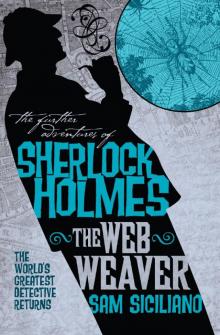 The Web Weaver
The Web Weaver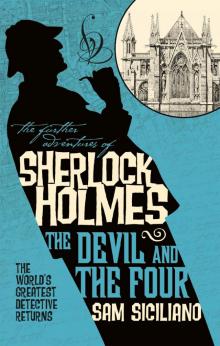 The Further Adventures of Sherlock Holmes--The Devil and the Four
The Further Adventures of Sherlock Holmes--The Devil and the Four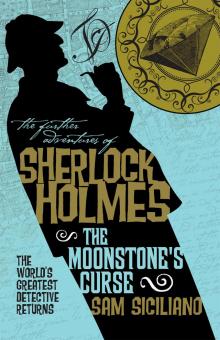 The Moonstone's Curse
The Moonstone's Curse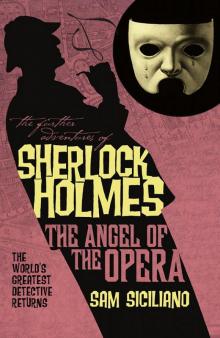 The Angel of the Opera
The Angel of the Opera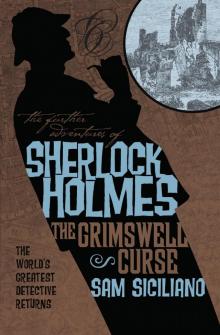 The Grimswell Curse
The Grimswell Curse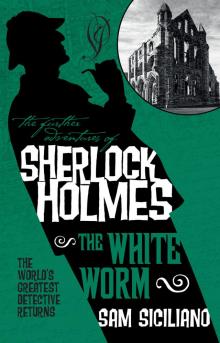 The White Worm
The White Worm